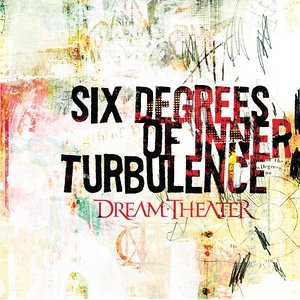| Six Degrees of Inner Turbulence (often abbreviated to SDOIT or 6DOIT) is the sixth full-length studio album by progressive metal band Dream Theater. It was released on January 29, 2002 by Elektra Records.
History
Fans' reactions to the album were mixed, with many pointing to the obvious differences between the two CDs as two different types of Dream Theater style. The first disc is generally seen as experimental and heavy while the second disc is seen to be more in line with the previous Scenes from a Memory.
Songs
The first track of the first disc begins with the white noise that ended Scenes from a Memory, while the last track, Losing Time/Grand Finale ends with a long chord played by (synthesized) strings, which was also used as the intro to their next studio album, Train of Thought.
The entire second disc is occupied by the 42-minute title song broken into 8 tracks.
The first track of the album, "The Glass Prison," tells Mike Portnoy's story of rehabilitation from alcoholism. "The Glass Prison" is composed of three parts and Portnoy intends to extend the song into twelve parts that mirror the twelve steps of the AA program by Bill W. for rehabilitation of alcoholics. This song is continued in tracks on the next albums ("This Dying Soul" on Train of Thought, "The Root of All Evil" on Octavarium and "Repentance" on Systematic Chaos).
The Great Debate is a non-partisan song dealing with the topic of stem-cell research.
The recording is a type of concept album wherein the five songs which comprise the first disc explore different themes of lifetime struggle, such as Alcoholism, Loss of Faith and Death. The sixth song—-that is, the complete second disc—-explores the stories of six individuals suffering from various mental illnesses. Particularly represented are bipolar, post-traumatic stress disorder, schizophrenia, post-partum depression, autism, and dissociative personality disorder. Furthermore, the title of the album may also allude to the fact that each song on the album could be seen as a different form of inner turbulence, with the six tracks making another reference to the six degrees.
The musical styles of each section of the title track are direct reflections of the band's large variety of influences. Indeed, classical, folk and metal styles combine effortlessly within the track. Additionally, certain parts of the track are direct nods to specific songs from influential artists. The main theme, which appears in the "Overture", at the end of "Goodnight Kiss," and in the "Grand Finale," bears an unquestionable resemblance to Kansas's "The Wall" from their Leftoverture album. "Solitary Shell" is a nod to Peter Gabriel's "Solsbury Hill" both in name and in musical style. Some fans see this as a citation, but others claim it's pure copying. Also, parts of "Solitary Shell" bear strong resemblance to Billy Joel's song "The Entertainer," mainly due to the unique synth-organ which sounds alike in both songs, played over acoustic guitar.
Influences for the album's writing and recording include Metallica's Master of Puppets, Tool's Ænima, Radiohead's The Bends (and also a Radiohead bootleg Mike brought in), Pantera's Far Beyond Driven, Megadeth's Rust in Peace, U2's Achtung Baby, Nine Inch Nails' The Downward Spiral, Soundgarden's Superunknown, Alice in Chains' Dirt, Kevin Gilbert's Thud, King's X's Faith Hope Love and Galactic Cowboys' Space in Your Face a Béla Bartók CD, Rage Against the Machine's The Battle of Los Angeles, Maria Tipo's Chopin Nocturnes.
"The Great Debate" was originally titled "Conflict at Ground Zero". "Disappear" was originally titled "Move On".
In the song, "Misunderstood," John Petrucci wrote and played the guitar solo, and then reversed it. He then learned how to play this reversed sound, and after recording it reversed it once more. This resulted in a solo that sounded like his original solo, but with a unique twist to the way the notes played.
The amount of songs on the record was another "nugget" by Mike Portnoy. The album officially has the shortest amount of songs on any DT album, but if the parts of "The Glass Prison" and "SDOIT" are counted it has the longest amount of songs on a DT album.
Disc one
1. "The Glass Prison"
I. "Reflection"
II. "Restoration"
III. "Revelation"
Mike Portnoy John Petrucci, John Myung, Jordan Rudess, Portnoy 13:52
2. "Blind Faith" James LaBrie Petrucci, Myung, Rudess, Portnoy 10:21
3. "Misunderstood" Petrucci Petrucci, Myung, Rudess, Portnoy 9:34
4. "The Great Debate" Petrucci Petrucci, Myung, Rudess, Portnoy 13:43
5. "Disappear" LaBrie Petrucci, Myung, Rudess, Portnoy 6:46
Disc two
1. "Six Degrees of Inner Turbulence"
I. "Overture"
II. "About to Crash"
III. "War Inside My Head"
IV. "The Test That Stumped Them All"
V. "Goodnight Kiss"
VI. "Solitary Shell"
VII. "About to Crash (Reprise)"
VIII. "Losing Time"/"Grand Finale"
Petrucci, Portnoy
(instrumental)
Petrucci
Portnoy
Portnoy
Portnoy
Petrucci
Petrucci
Petrucci
Petrucci, Myung, Rudess, Portnoy 42:04
6:50
5:51
2:08
5:03
6:17
5:48
4:05
6:01
Chart performance
Billboard 200:
Six Degrees of Inner Turbulence - #46
Billboard Top Internet Albums:
Six Degrees of Inner Turbulence - #1
Personnel
James LaBrie – lead vocals
John Myung – bass
John Petrucci – guitar, backing vocals
Mike Portnoy – drums, backing vocals
Jordan Rudess – keyboards
Read more on Last.fm. User-contributed text is available under the Creative Commons By-SA License; additional terms may apply. |
